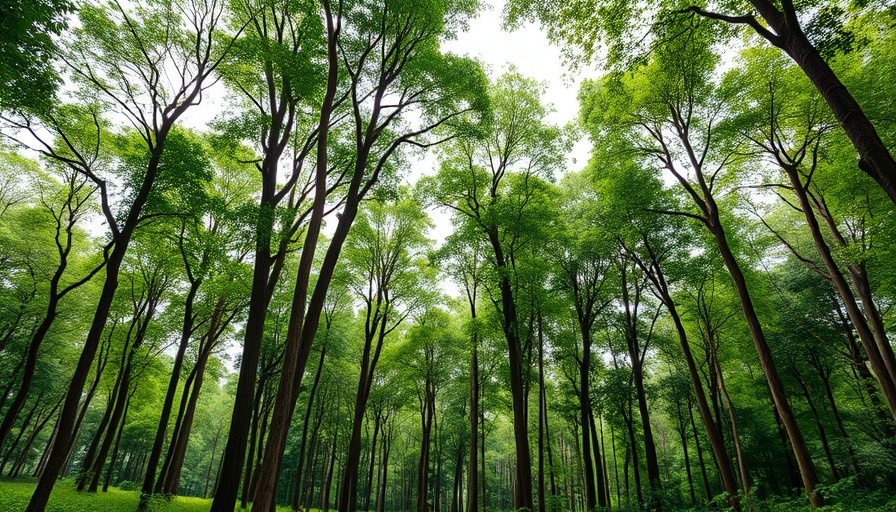
An Ancient Treasure: The Story of Thanaka Trees
Thailanders and global travelers alike may have come across Thanaka's enchanting presence through photos of Myanmar's cultural heritage. For over 2,000 years, this fragrant tree has been woven into the fabric of daily life, cherished for its skin-soothing properties and refreshing qualities. With over 300,000 acres now cultivated nationwide, the growth and legacy of Thanaka underscore its cultural significance and the promise of sustainable travel.
Rediscovering Thanaka: Cultural Significance and Sustainability
Thanaka represents more than just a tree; it embodies Myanmar’s national pride. Long used in traditional cosmetics to protect and beautify the skin, the tree has nurtured generations. The past shows us that appreciation for natural resources can be central to a culture that values sustainability. With increased cultivation, ensuring its longevity and health in the ecosystem becomes paramount. Responsible tourism can support this initiative, drawing visitors eager to learn about sustainable practices and the intrinsic value of Thanaka trees.
Why Cultivation Translates To Responsibility
As Myanmar sees the rise of Thanaka cultivation, the travel sector carries a responsibility to promote ethical tourism. Travelers can play an integral role by supporting local farms and eco-friendly practices that respect both the land and its history. Participating in eco-tourism not only sustains but enriches the life around it, helping farmers live better lives while maintaining the health of their treasured resources.
Benefits of Thanaka: Health and Beauty in Nature
Known for its ability to moisturize and cool the skin, Thanaka is lauded for delivering a variety of health benefits. As part of a skincare routine, it revitalizes and enhances the complexion naturally. Furthermore, its cultivation reflects a connection to nature, reminding us of the healing properties rooted in our surroundings. Sustainable travel advocates can introduce new ways to incorporate these natural remedies into their daily lives while sharing enriching experiences with others.
Harvesting and Planting: Steps for a Sustainable Future
To ensure the thriving of Thanaka, the seeds are harvested carefully, only using those that sink after soaking in water. This meticulous method reflects a dedication to quality and sustainable practices. Adoption of sound harvesting techniques not only boosts profit but also ensures that the region maintains its delicate ecology. Those who wish to cultivate their understanding and practice sustainability can consider supporting or volunteering with local organizations committed to this traditional craft.
A Community Effort: Planting Thanaka Trees
Local farmers have discovered that planting Thanaka trees requires a community focus. The trees thrive well when intercropped with other plants that support their growth and yield. This agricultural method also provides better soil health, thereby contributing to the local ecosystem. For eco-conscious travelers, the idea of engaging with communities around agricultural practices resonates deeply, offering opportunities of learning while weaving connections with locals.
Finding Balance: The Impact of Weather and Soil on Growth
Thanaka trees flourish in specific conditions, particularly in loamy and gravel soils with appropriate rainfall. As travelers explore this beautiful nation, the ecological aspects of life are evident. When learning about the environmental challenges affecting these trees, we can dive deeper into challenges faced due to climate change—and take informed actions to mitigate impact during our travels.
Looking to the Future: Preparing for Sustainable Travel
As we see more Thanaka trees cultivated nationwide, it endlessly branches out into a future of potential. Responsible travelers can help ensure that practices around these trees remain sustainable, with a focus on ethical tourism; supporting local economy, culture, and nature. These important trees symbolize hope for better practices, and every visit to Myanmar becomes an act of loving and understanding its traditions.
By engaging with eco-friendly tourism, you take a proactive step towards creating sustainable travel experiences that resonate with the heart of the land. Countries like Myanmar offer opportunities to connect with our roots while experiencing the richness of tradition. Explore responsibly and cherish the beauty of nature as part of your journey!
 Add Row
Add Row  Add
Add 




Write A Comment